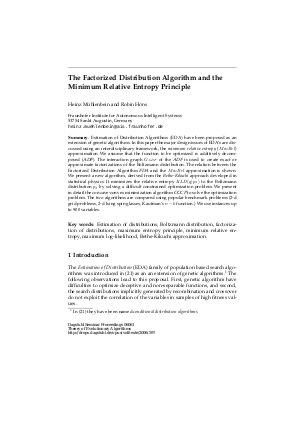The Factorized Distribution Algorithm and the Minimum Relative Entropy Principle
Authors Heinz Mühlenbein, Robin Höns
-
Part of:
Volume:
Dagstuhl Seminar Proceedings, Volume 6061
Part of: Series: Dagstuhl Seminar Proceedings (DagSemProc) - License:
 Creative Commons Attribution 4.0 International license
Creative Commons Attribution 4.0 International license
- Publication Date: 2006-07-07
File

PDF
DagSemProc.06061.9.pdf
- Filesize: 263 kB
- 27 pages
Document Identifiers
Subject Classification
Keywords
- Junction tree
- minimum relative entropy
- maximum likelihood
- Bethe-Kikuchi approximation
Metrics
- Access Statistics
-
Total Accesses (updated on a weekly basis)
0PDF Downloads0Metadata Views
Abstract
We assume that the function to be optimized is additively decomposed (ADF). Then the interaction graph $G_{ADF}$ can be used to compute exact or approximate factorizations. For many practical problems only approximate factorizations lead to efficient optimization algorithms. The relation between the approximation used by the FDA algorithm and the minimum relative entropy principle is discussed. A new algorithm is presented, derived from the Bethe-Kikuchi approach in statistical physics. It minimizes the relative entropy to a Boltzmann distribution with fixed $eta$. We shortly compare different factorizations and algorithms within the FDA software. We use 2-d Ising spin glass problems and Kaufman's n-k function as examples.
Cite As Get BibTex
Heinz Mühlenbein and Robin Höns. The Factorized Distribution Algorithm and the Minimum Relative Entropy Principle. In Theory of Evolutionary Algorithms. Dagstuhl Seminar Proceedings, Volume 6061, pp. 1-27, Schloss Dagstuhl – Leibniz-Zentrum für Informatik (2006)
https://doi.org/10.4230/DagSemProc.06061.9
BibTex
@InProceedings{muhlenbein_et_al:DagSemProc.06061.9,
author = {M\"{u}hlenbein, Heinz and H\"{o}ns, Robin},
title = {{The Factorized Distribution Algorithm and the Minimum Relative Entropy Principle}},
booktitle = {Theory of Evolutionary Algorithms},
pages = {1--27},
series = {Dagstuhl Seminar Proceedings (DagSemProc)},
ISSN = {1862-4405},
year = {2006},
volume = {6061},
editor = {Dirk V. Arnold and Thomas Jansen and Michael D. Vose and Jonathan E. Rowe},
publisher = {Schloss Dagstuhl -- Leibniz-Zentrum f{\"u}r Informatik},
address = {Dagstuhl, Germany},
URL = {https://drops.dagstuhl.de/entities/document/10.4230/DagSemProc.06061.9},
URN = {urn:nbn:de:0030-drops-5973},
doi = {10.4230/DagSemProc.06061.9},
annote = {Keywords: Junction tree, minimum relative entropy, maximum likelihood, Bethe-Kikuchi approximation}
}
